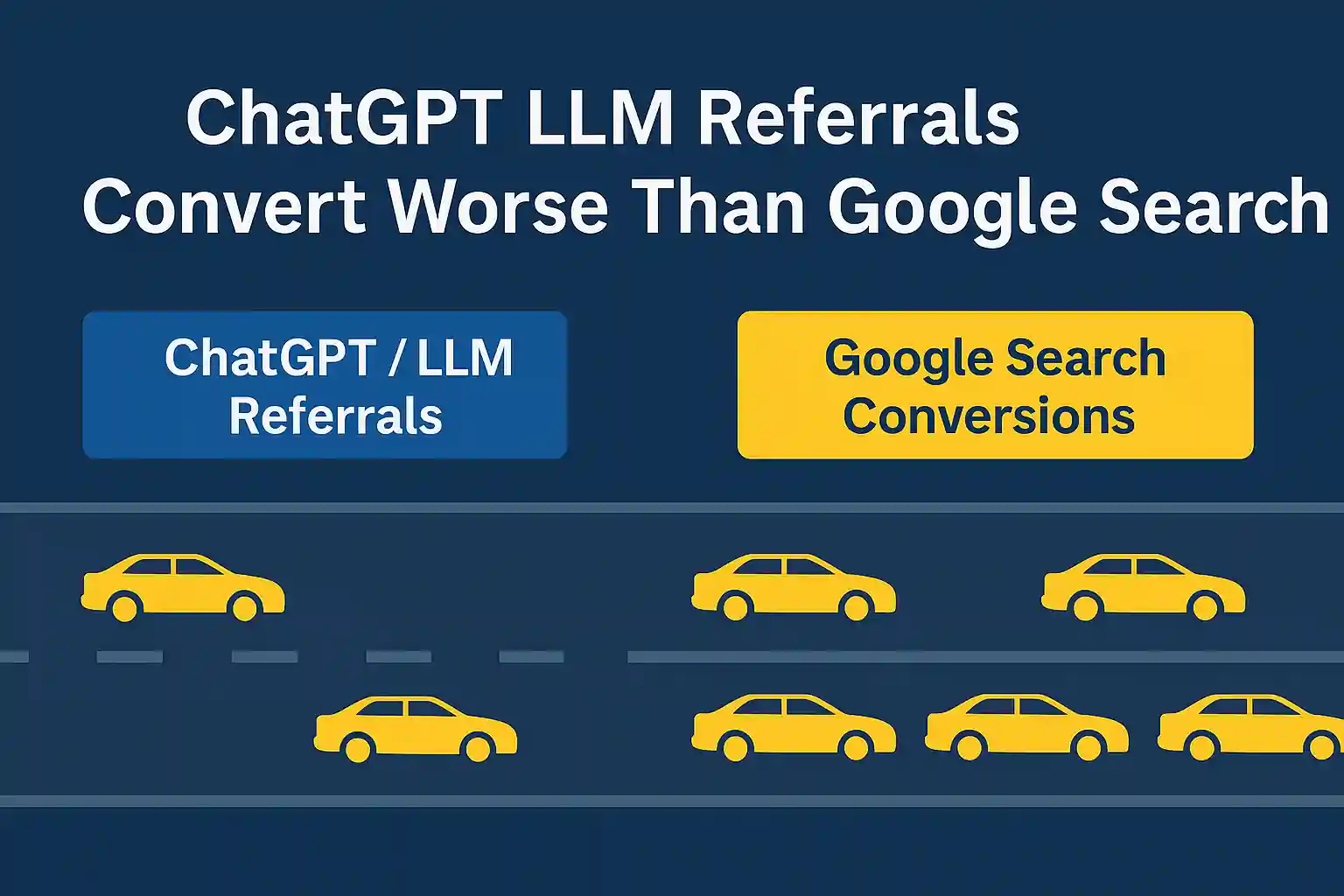Introduction
Ever wondered if traffic from ChatGPT or other AI tools actually buys more than traffic from Google Search? It sounds logical people ask AI, get precise answers, click, and convert. But new research shows a different reality. Large Language Model (LLM) referrals like ChatGPT may send curious visitors, not committed buyers. For marketers and SEO professionals, this is a big deal because it highlights how search intent still rules the conversion game.
What Did the Study Reveal About ChatGPT and LLM Referrals?
The study found that Google Search still drives stronger and more consistent conversions than ChatGPT or other LLM-based sources. While LLMs generate some referral traffic, it’s tiny compared to Google’s massive search volume.
In most industries, organic search brought higher-intent users who were ready to purchase or engage. LLM visitors often arrived earlier in the decision journey more curious than committed. Even when conversion rates looked similar, the overall impact was smaller because AI traffic volume remains minimal.
Why Do ChatGPT and LLM Referrals Convert Worse?
1. Users Don’t Fully Trust LLMs Yet
People still prefer confirming information through search before purchasing. LLMs provide answers quickly, but users often verify results through Google or brand websites before they act.
2. AI Traffic Is Still Too Small
Even if a few users convert, the overall share of LLM traffic is so low that it doesn’t make a dent in total revenue or leads.
3. Attribution Doesn’t Capture the Full Picture
Analytics systems often give credit to the last click and that’s usually Google. LLMs might assist earlier in research, but conversions still get counted under search.
4. Varying Industry Behaviour
B2B and e-commerce behave differently. LLM referrals may help in research-heavy fields like finance or health, but they underperform in fast-decision sectors like retail or entertainment.
5. AI Answers Reduce the Need to Click
ChatGPT often gives complete responses directly. That means users don’t need to click through to websites, which lowers referral intent and, naturally, conversions.
Should You Still Focus on LLM Optimization?
Absolutely but with balance.
LLM traffic isn’t useless; it’s just early-stage. As AI assistants integrate deeper into daily life, the share will rise. The smart move is to combine SEO and AEO (Answer Engine Optimization).
- Keep improving your content for Google Search visibility it’s still your main revenue channel.
- Start experimenting with how your brand appears in AI answers and summaries.
- Track your ChatGPT, Gemini, and other AI referrals in analytics to see where users come from and how they behave.
As one digital strategist explained it perfectly: “LLM referrals are worth tracking, not chasing. The real ROI is still in organic search.”
How to Adapt Your SEO Strategy After This Study
1. Structure Content Clearly
Use headings, schema markup, and FAQs so both Google and AI tools can easily understand and summarize your content.
2. Target Mid and Bottom-Funnel Queries
LLM traffic often lands when users are exploring. Add pages that speak to decision-stage needs pricing, comparisons, case studies, and trust factors.
3. Optimize for Trust and Conversion
Use strong CTAs, testimonials, and clear forms. When AI visitors arrive, you want them to find fast answers and confidence in your offer.
4. Monitor AI-Driven Traffic
Set up tracking tags in your analytics tools to identify referrals from AI systems like ChatGPT, Copilot, or Gemini.
5. Blend SEO and AEO Strategies
SEO keeps your rankings alive. AEO ensures AI understands your content. The winning formula is hybrid optimization for both search engines and AI assistants.
FAQs
Q1. Why does Google Search outperform ChatGPT in conversions?
Because search users often have clear intent they’re already looking to buy or act, unlike AI users who are exploring.
Q2. Should I stop caring about ChatGPT traffic?
No. Track it, learn from it, but don’t rely on it yet for conversions.
Q3. Can LLM traffic improve in the future?
Yes, as AI platforms integrate with shopping and advertising tools, conversion potential will rise.
Q4. What’s the best mix of SEO and AEO right now?
Keep 80% focus on traditional SEO for visibility and 20% on optimizing for AI-driven discovery.
Q5. How can I prepare for future LLM growth?
Keep your content structured, data-driven, and conversational so it fits both Google and AI assistant algorithms.
Conclusion
Right now, Google Search continues to rule the conversion charts. LLMs like ChatGPT bring visibility and curiosity but not high conversion intent at least not yet. Marketers should stay prepared for the coming shift but keep their main focus on organic traffic that delivers measurable results.
As the AI ecosystem matures, the gap between LLM and organic conversions may shrink. Until then, SEO remains your most reliable growth engine
